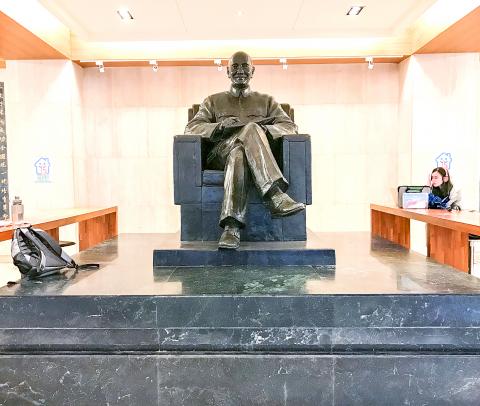National Chengchi University yesterday passed a motion at an administrative affairs meeting that called for statues of Chiang Kai-shek (蔣介石) to be removed as part of efforts to promote human rights and transitional justice.
The decision was in response to protests last year, when students plastered a statue of Chiang with fliers containing the names of people killed in the 228 Incident and called for the statue’s removal.
The university was established in Nanjing, China, in 1927 to train people to serve in the Chinese Nationalist Party (KMT) and was moved to Taiwan when the party fled China.

Photo: Huang Yao-cheng, Taipei Times
Chiang was president of the institution from its establishment until 1947 and was given the honorary title of “perpetual president emeritus.”
Two large bronze statues of Chiang were erected at the university: one in a sitting position in the library and one on horseback at the rear of the school’s campus.
Hsu Tzu-wei (徐子為), head of the university’s graduate students association, said that after last year’s protests by the Wildfire Front student group, university officials repeatedly delayed the removal of the statues.
Opponents said at the meeting that removing the statues would hurt the school’s integrity and international reputation, adding that Chiang’s contributions should be discussed alongside his mistakes.
Removing the statues would be an important first step toward transitional justice, Hsu said, adding that the 228 Incident and the subsequent White Terror era were the direct result of Chiang’s authoritarian rule.
As some of the university’s students are descendants of White Terror victims, honoring Chiang with statues is a second attack on victims’ families, he added.
The four-hour meeting ended with 52 of 68 votes in favor of the statues’ removal, Graduate Institute of Development Studies professor Lee Yeau-tarn (李酉潭) said.
Lee said he would lead a team of seven other professors and three student representatives to discuss how to move forward with relocating the statues to an “appropriate location.”
National Taiwan University history professor Hua Yih-fen (花亦芬) lauded the decision, saying that educators should seek to espouse the values of freedom and democracy, adding that allowing the statues to remain at the university would run counter to those values.
“Fortunately, National Chengchi University was willing to follow sound advice,” she said, adding that transitional justice involves more than just judicial and political elements.
“The removal of the statues honoring Chiang was long overdue,” National Chengchi University associate professor Liu Hung-en (劉宏恩) said.
Regardless of one’s evaluation of Chiang as a political leader, it is absurd to have a president’s statue on campus that is more than three times taller than a person’s height, he said.
If the statues were meant to honor the university’s founder, then every institution should have similar statues, Liu said, adding that the university’s association with a particular party is a source of frustration for many students and professors.
“If it is not a KMT school, why are statues from the period of authoritarian KMT rule kept?” Liu asked.
“What is the reason behind keeping the statue of someone who killed so many people?” asked one student, who declined to be named.

DAREDEVIL: Honnold said it had always been a dream of his to climb Taipei 101, while a Netflix producer said the skyscraper was ‘a real icon of this country’ US climber Alex Honnold yesterday took on Taiwan’s tallest building, becoming the first person to scale Taipei 101 without a rope, harness or safety net. Hundreds of spectators gathered at the base of the 101-story skyscraper to watch Honnold, 40, embark on his daredevil feat, which was also broadcast live on Netflix. Dressed in a red T-shirt and yellow custom-made climbing shoes, Honnold swiftly moved up the southeast face of the glass and steel building. At one point, he stepped onto a platform midway up to wave down at fans and onlookers who were taking photos. People watching from inside

A Vietnamese migrant worker yesterday won NT$12 million (US$379,627) on a Lunar New Year scratch card in Kaohsiung as part of Taiwan Lottery Co’s (台灣彩券) “NT$12 Million Grand Fortune” (1200萬大吉利) game. The man was the first top-prize winner of the new game launched on Jan. 6 to mark the Lunar New Year. Three Vietnamese migrant workers visited a Taiwan Lottery shop on Xinyue Street in Kaohsiung’s Gangshan District (崗山), a store representative said. The player bought multiple tickets and, after winning nothing, held the final lottery ticket in one hand and rubbed the store’s statue of the Maitreya Buddha’s belly with the other,

‘NATO-PLUS’: ‘Our strategic partners in the Indo-Pacific are facing increasing aggression by the Chinese Communist Party,’ US Representative Rob Wittman said The US House of Representatives on Monday released its version of the Consolidated Appropriations Act, which includes US$1.15 billion to support security cooperation with Taiwan. The omnibus act, covering US$1.2 trillion of spending, allocates US$1 billion for the Taiwan Security Cooperation Initiative, as well as US$150 million for the replacement of defense articles and reimbursement of defense services provided to Taiwan. The fund allocations were based on the US National Defense Authorization Act for fiscal 2026 that was passed by the US Congress last month and authorized up to US$1 billion to the US Defense Security Cooperation Agency in support of the

‘COMMITTED TO DETERRENCE’: Washington would stand by its allies, but it can only help as much as countries help themselves, Raymond Greene said The US is committed to deterrence in the first island chain, but it should not bear the burden alone, as “freedom is not free,” American Institute in Taiwan Director Raymond Greene said in a speech at the Institute for National Defense and Security Research’s “Strengthening Resilience: Defense as the Engine of Development” seminar in Taipei yesterday. In the speech, titled “Investing Together and a Secure and Prosperous Future,” Greene highlighted the contributions of US President Donald Trump’s administration to Taiwan’s defense efforts, including the establishment of supply chains for drones and autonomous systems, offers of security assistance and the expansion of